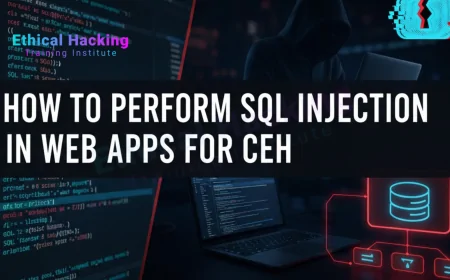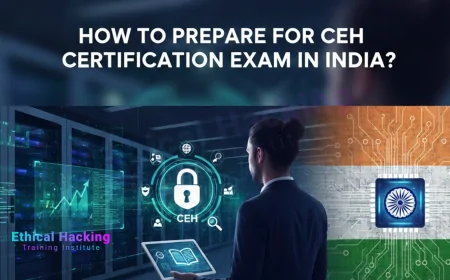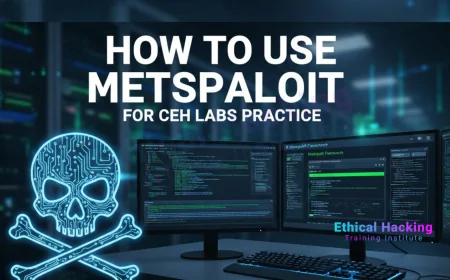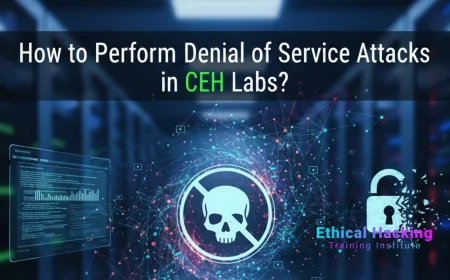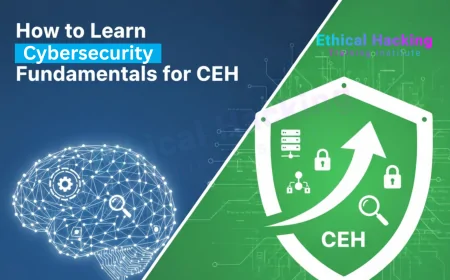The Computer Hacking Forensic Investigator Course: What You’ll Learn and Why It’s Essential | CHFI Certification Course: Everything You’ll Learn and Why It’s Important
Explore the Computer Hacking Forensic Investigator (CHFI) course, what you'll learn, why it's essential, and how it boosts your cybersecurity career with digital forensics skills.
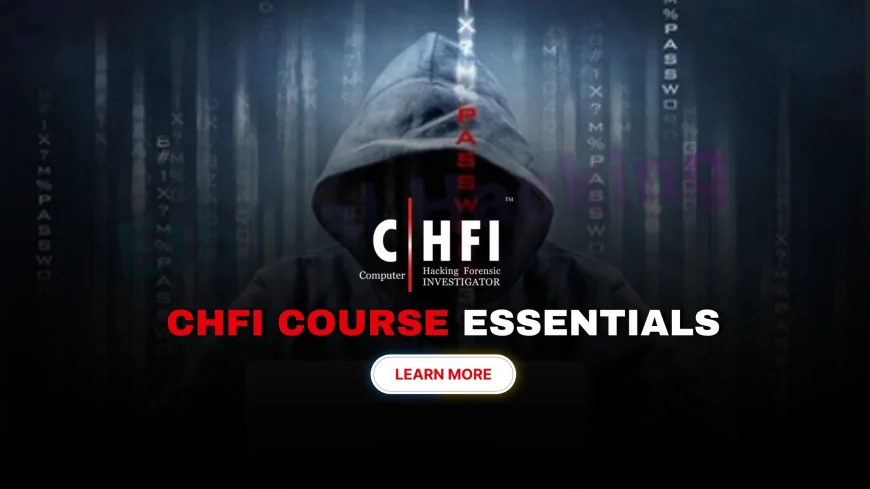
Table of Contents
- Introduction
- What is the CHFI Course?
- Why the CHFI Course is Essential
- Key Learning Modules of CHFI
- Tools Covered in CHFI
- CHFI vs Other Forensic Certifications
- Career Opportunities After CHFI
- CHFI Exam Details
- Study Tips for CHFI Aspirants
- FAQs
- Conclusion
Introduction
In today’s digitally interconnected world, cybercrime is no longer the exception—it’s the norm. As threats grow in complexity, so does the demand for professionals who can track, analyze, and present digital evidence. That’s where the Computer Hacking Forensic Investigator (CHFI) course comes in. Offered by EC-Council, CHFI trains cybersecurity professionals to investigate cyberattacks and legally handle electronic evidence. If you're aiming to build a career in digital forensics, cyber law enforcement, or corporate security, CHFI is a vital credential.
What is the CHFI Course?
EC-Council’s CHFI certification program prepares individuals for careers in computer forensics and cybercrime investigation. It provides in-depth knowledge of digital forensics, cyber investigations, and evidence collection techniques. The course is ideal for ethical hackers, incident response teams, security professionals, auditors, and law enforcement officers who wish to acquire skills in computer forensic analysis.
The CHFI v10 (latest version) offers a systematic approach to detecting hacking attacks and properly extracting, analyzing, and presenting evidence for prosecution. It covers a wide range of topics from disk forensics and email analysis to mobile and cloud investigations.
Why the CHFI Course is Essential
In today’s rapidly evolving digital ecosystem, cyber threats are no longer limited to large-scale breaches or organized cybercrime—they now extend to internal fraud, data leakage, espionage, and ransomware. The Computer Hacking Forensic Investigator (CHFI) course stands out as a critical training program that equips professionals with the knowledge and skills to respond to these threats effectively. But why exactly is CHFI essential for anyone aspiring to or already working in cybersecurity?
1. It Bridges the Gap Between Cybercrime and Legal Evidence
Unlike general cybersecurity certifications, CHFI focuses on **digital forensics**—the practice of identifying, collecting, analyzing, and preserving electronic evidence in a way that is legally admissible in court. As organizations and courts rely heavily on digital data, the ability to handle such evidence properly is invaluable.
2. It Validates Advanced Forensic Skills
CHFI is a globally recognized certification that demonstrates your ability to investigate network intrusions, recover deleted files, analyze malware, and detect insider threats. This validation gives you a competitive edge in job markets and boosts employer confidence.
3. It Aligns with Industry Standards and Compliance
With increasing regulations like **GDPR, HIPAA, PCI-DSS, and ISO 27001**, companies must ensure proper forensic investigation and reporting. CHFI-certified professionals understand how to collect and document digital evidence to support compliance, reduce risk, and support incident response teams.
4. It Enables Real-World Investigative Readiness
From FTK to Wireshark, CHFI's lab-driven approach with 50+ exercises sharpens your ability to solve complex forensic cases. Whether you're analyzing log files, memory dumps, or encrypted data, CHFI ensures you’re prepared for hands-on forensic work.
5. It Opens the Door to High-Demand Careers
Digital forensics professionals are needed in government, corporate, financial, healthcare, and law enforcement sectors. After CHFI, roles such as **Digital Forensic Analyst, Cybercrime Investigator, and Incident Response Specialist** become attainable, offering high salaries and job security.
6. It Prepares You for Complex Cyber Investigations
Today’s attacks often involve multiple vectors—phishing, malware, privilege escalation, and lateral movement. CHFI prepares you to track an attacker’s digital footprint across devices and platforms, reconstruct attack timelines, and uncover hidden evidence—even if it's been partially deleted or obfuscated.
7. It’s Recognized by Law Enforcement and Enterprises Globally
EC-Council’s CHFI is ANSI-accredited and trusted by law enforcement, the military, and Fortune 500 companies. Certification makes your profile more credible across international borders, giving you mobility in your career and freelance opportunities.
Key Learning Modules of CHFI
CHFI’s curriculum is broad and comprehensive. Key modules include:
- Forensics in Today’s World
- Investigation Processes and Legal Guidelines
- Disk Forensics: Partition Recovery, File System Analysis
- Memory and Registry Forensics
- Network and Email Forensics
- Mobile Device and IoT Forensics
- Cloud Forensics and Anti-Forensics
- Steganography, Malware, and Dark Web Forensics
Tools Covered in CHFI
The CHFI course offers hands-on experience with more than 50 industry-standard tools:
- FTK (Forensic Toolkit)
- Autopsy & Sleuth Kit
- EnCase Forensic
- Wireshark
- X-Ways Forensics
- OSForensics
- ProDiscover
This practical exposure ensures that learners can function effectively in real-world scenarios.
CHFI vs Other Forensic Certifications
How does CHFI compare with other certifications?
| Certification | Focus Area | Recommended For |
|---|---|---|
| CHFI (EC-Council) | Comprehensive digital forensics | Security professionals, beginners, investigators |
| GCFA (SANS) | Advanced forensic analysis | Experienced analysts, incident responders |
| EnCE (OpenText) | EnCase users and tool specialists | Corporate and law enforcement professionals |
Career Opportunities After CHFI
Certified CHFI professionals are eligible for high-demand job roles, including:
- Digital Forensic Analyst
- Cybercrime Investigator
- Security Operations Center (SOC) Analyst
- Incident Responder
- Legal Evidence Analyst
Average Salary: ₹8–20 LPA (India) / $80,000–$140,000 (USA), depending on experience and region.
CHFI Exam Details
- Exam Code: 312-49 (CHFI v10)
- Duration: 4 Hours
- Questions: 150 Multiple Choice
- Passing Score: 70%
- Mode: ECC Exam Portal (Online / Proctored)
Study Tips for CHFI Aspirants
- Use official EC-Council courseware and labs.
- Create a virtual forensic lab at home using Autopsy and Kali Linux.
- Practice with case studies and mock challenges.
- Join cybersecurity forums, Discord groups, or Reddit threads.
- Revise regularly and use flashcards for tools, commands, and legal terms.
Frequently Asked Questions (FAQs)
1. What is CHFI?
CHFI stands for Computer Hacking Forensic Investigator, a certification offered by EC-Council focused on digital forensic skills.
2. Who should take the CHFI course?
Security professionals, law enforcement officers, ethical hackers, and IT auditors benefit from the CHFI certification.
3. Is CHFI better than CEH?
Both are EC-Council certifications; CEH focuses on penetration testing, while CHFI is focused on digital investigation and forensics.
4. How long is the CHFI certification valid?
It’s valid for 3 years and requires EC-Council Continuing Education credits for renewal.
5. What are the prerequisites for CHFI?
There are no strict prerequisites, but prior knowledge in networking or CEH-level concepts is helpful.
6. How do I register for the CHFI exam?
You can register through EC-Council’s website or an Authorized Training Partner.
7. Can I take CHFI online?
Yes, EC-Council offers online training and proctored online exams for CHFI.
8. How is CHFI different from GCFA?
CHFI is broader and beginner-friendly; GCFA is more advanced and ideal for experienced analysts.
9. What’s the cost of CHFI?
Globally, it ranges from $500–$1500. In India, it’s ₹35,000–₹90,000 depending on the training mode.
10. What topics are covered in CHFI?
Disk, memory, network, mobile, cloud forensics, steganography, malware, and legal procedures.
11. Is CHFI recognized globally?
Yes, CHFI is ANSI-accredited and recognized by law enforcement, government, and Fortune 500 companies.
12. Can CHFI help me work in law enforcement?
Yes, CHFI certification enhances your eligibility for roles in cybercrime investigation units.
13. What lab tools are included in CHFI?
Autopsy, FTK Imager, EnCase, Wireshark, X-Ways, and OSForensics are used in hands-on training.
14. What is the difficulty level of the CHFI exam?
Moderate. With proper preparation and practice, most candidates pass on their first attempt.
15. Do I get a digital badge with CHFI?
Yes, EC-Council provides a verified digital badge and certificate upon successful completion.
16. Does CHFI require programming knowledge?
No, but having basic scripting knowledge can be beneficial for log analysis and automation.
17. Can CHFI be used for freelance or consulting work?
Absolutely. Certified professionals often work as private investigators or forensic consultants.
18. How is CHFI helpful in corporate settings?
It enables internal investigations of data breaches, insider threats, and employee misconduct.
19. What version of CHFI is current?
As of 2025, the latest version is CHFI v10.
20. Is CHFI required for cybersecurity jobs?
Not required, but highly recommended for roles involving digital evidence handling or legal compliance.
Conclusion
The CHFI course by EC-Council is more than a certification—it's a career-defining step into the high-stakes world of cybercrime investigation. With the explosion in digital attacks, every organization—from governments to corporations—needs trained professionals who can investigate, preserve, and act on digital evidence. Whether you're new to cybersecurity or transitioning into forensic roles, CHFI offers a robust, hands-on curriculum that aligns with industry demands and legal standards. It’s not just essential—it’s indispensable.
What's Your Reaction?
 Like
0
Like
0
 Dislike
0
Dislike
0
 Love
0
Love
0
 Funny
0
Funny
0
 Angry
0
Angry
0
 Sad
0
Sad
0
 Wow
0
Wow
0






